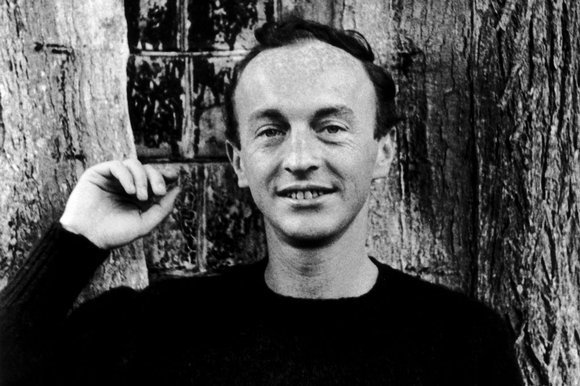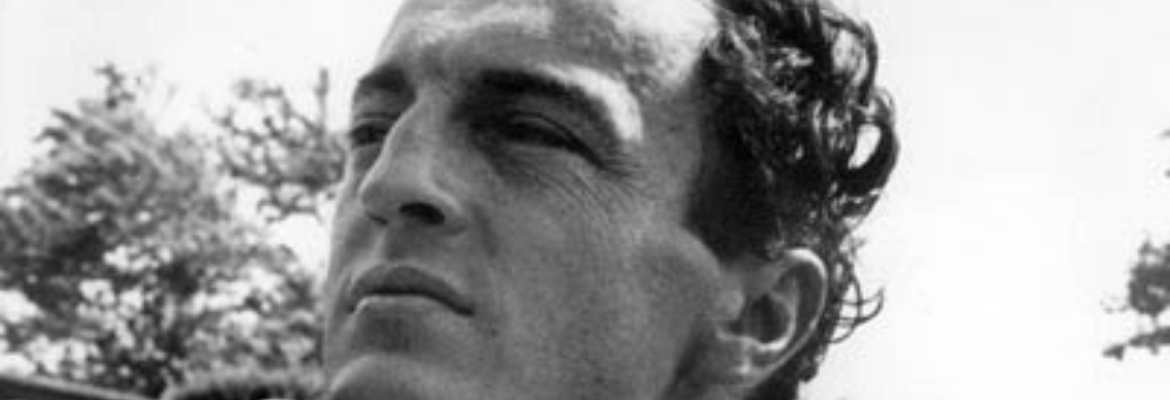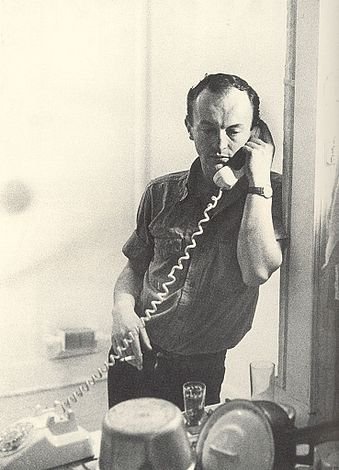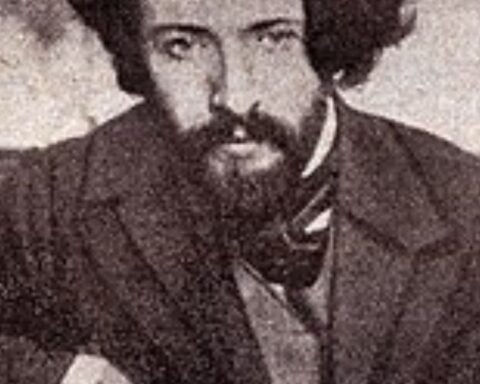Inizia così Statement for the new American poetry, un breve saggio in cui, con l’umorismo, la leggerezza e la commovente semplicità che contraddistinguono la sua opera, Frank O’Hara prova a descrivere in prosa le caratteristiche della sua poesia:
«I am mainly preoccupied with the world as I experience it, and at times when I would rather be dead the thought that I could never write a poem has so far stopped me. I think this is an ignobile attitude. I would rather die for love, but I haven’t».
[traduzione]
Idea che sviluppò più diffusamente quando scrisse il manifesto del Personismo, il movimento letterario che decise di fondare.
[Personism] was founded by me after lunch with LeRoi Jones on August 27, 1959, a day in which I was in love with someone (not Roy, by the way, a blond). I went back to work and wrote a poem for this person. While I was writing it I was realizing that if I wanted to I could use the telephone instead of writing the poem, and so Personism was born.
[traduzione]
Può apparire quantomeno bizzarro il fatto che si inizi a trattare di un poeta citando due passi in prosa. Il motivo è abbastanza semplice: questi passi rendono l’idea di quanto sovversiva e anticonvenzionale sia non solo l’opera di Frank, ma anche la persona in sé. Niente cliché del poeta solitario, maledetto o intellettuale. Frank O’Hara era uno degli uomini più trendy della New York di metà secolo! Aveva centinaia di amici, di ammiratori, di amanti, era un uomo estremamente generoso, mai stanco di andare a feste, eclettico. Era un bevitore scatenato, la sua capacità di reggere l’alcol è stata descritta come «truly monumental», mossa da un machismo, da una volontà di mostrare un’anima rude in un uomo gay, al tempo in cui la Gay Liberation non era ancora ultimata.
Così si descrive in uno dei suoi componimenti:
Autobiographia Literaria
When I was a child
I played by myself in a
corner of the schoolyard
all alone.
I hated dolls and I
hated games, animals were
not friendly and birds
flew away.
If anyone was looking
for me I hid behind a
tree and cried out “I am
an orphan.”
And here I am, the center of all beauty! writing these poems! Imagine!
La poesia di Frank O’Hara, come fa notare John Ashbery, un poeta e critico letterario americano che fu amico di Frank O’Hara, non ha alcun tipo di programma, e proprio per questo non ci si può aderire. Nell’America degli anni ’50, O’Hara non guarda al sesso o alla droga come una panacea per i mali della società, non si schiera contro la guerra in Vietnam o a favore dei diritti civili, tantomeno si interessa allo scenario post-bomba atomica. E non è una scelta controcorrente mirata da intenti sovversivi: è l’idea che la poesia sia la voce del poeta, una voce che, prese le distanze da qualunque tipo di confessionalismo o monologo interiore, narra che cosa succede a New York durante la pausa pranzo per le strade di Manhattan.
Viene ora da chiedersi: che cosa hanno di speciale le strade di Manhattan alle 12.40 del giovedì pomeriggio per essere oggetto della poesia? Niente! Nessun simbolismo, niente che stia dietro la superficie delle parole; semmai, è la superficie stessa a creare un microcosmo del mondo del poeta che chiunque può vedere o provare. Basta, appunto, passare a Times Square durante la pausa pranzo di un qualunque giorno della settimana. Niente a che vedere con il poeta come uomo dotato di sensibilità particolare ed estrema; i versi di Frank O’Hara sono limpidi, radiosi e incredibilmente moderni. Prima di procedere con il discorso, è il caso che a parlare sia la poesia di Frank, visto che finora è stata perlopiù taciuta, e nessuna spiegazione può essere icastica e pregnante quanto i versi stessi.
Getting ahead of someone (sun)
I cough a lot (sinus?) so I
get up and gave some tea with cognac
it is dawn
the light flows evenly along the lawn
in chilly Southampton and I smoke
and hours and hours go by I read
van Vechten’s Spider Boy the a short
story by Patsy Southgate and a poem
by myself it is cold and I shiver a little
in white shorts the day begun
so oddly not tired not nervous I
am for once truly awake letting it all
start slowly as I watch instead of
grabbing on late as usual
where didi t go
it’s not really awake yet
I will wait
And the house wakes up and goes
to get the dog in Sag Harbor I make
myself a bourbon and commence
to write any of my “I do this I do that”
poems in a sketch pad
it is tomorrow
though only six hours have gone by
each day’s light has more significance these days
Questa poesia si chiama Getting ahead of someone (sun) e non racconta niente, se non una mattina in cui il poeta non stava particolarmente bene e si è svegliato presto e ha scritto una poesia. Frank O’Hara scriveva poesie in ogni momento; le scriveva appena sveglio, le scriveva nel suo studio al MoMA – dove lavorò come curatore, le scriveva durante la pausa pranzo, se le dimenticava in vecchi libri, su scrivanie, le regalava ad amici, e in tutto questo riusciva a non scadere mai nella banalità della poesia classica – che discostandosi dai veri colossi spesso diventa triste e malriuscita imitazione.
Frank O’Hara lavorò a strettissimo contatto con artisti contemporanei di New York, ed è come se avesse provato a fare nella poesia quello che Jackson Pollock aveva fatto con l’arte: rivoluzionarla, modernizzarla, tenerla al passo coi tempi, fresca, vivace ma al tempo stesso capace di emozionare.
Frank passò in realtà in secondo piano nella scena letteraria americana, perché dovette convivere con la Beat Generation, con gli impegnati Ginsberg, Kerouac, Corso, autori con cui Frank intrattenne rapporti di amicizia ma che dal punto di vista della poesia ebbero certamente più fama.
Frank O’Hara, come è stato più volte finora ribadito, rifuggiva da confessionalismi, retoriche e classicismi; non rifugge, però, il tema che più di tutti è stato trattato dalla poesia, l’amore. L’amore che compare nei suoi versi è un amore vivo, felice, ardente, raccontato in un modo che quasi mai si incontra nei versi di poeti provenienti dalle più disparate cronologie o geografie. E forse è il caso, ancora una volta, di lasciare a lui la parola, con un componimento, tra tutti, che mostra l’intensità dello stile “tutto d’un fiato” di Frank e la capacità di esternare sentimenti senza metafore o senza mezzi termini, semplicemente mostrando la vita nella sua grande, commovente e mai banale semplicità.
Poem
When I am feeling depressed and anxious sullen
all you have to do is take your clothes off
and all is wiped away revealing life’s tenderness
that we are flesh and breathe and are near us
as you are really as you are I become as I
really ama live and knowing vaguely what is
and what is important to me above the intrusions
of incident and accidental relationships
which have nothing to do with my life
when I am in your presence I feel life is strong
and will defeat all its enemies and all of mine
and all of yours and yours in you and mine in me
sick logic and feeble reasoning are cured
by the perfect symmetry of your arms and legs
spread out making and eternal circle together
creating a golden pillar beside the Atlantic
the faint line of hair dividing your torso
gives my mind rest and emotion their release
into the infinite air where since once we are
together we always will be free in this life come what may
Per concludere, ancora una volta la parola passi ai versi di Frank O’Hara, con la poesia più famosa e probabilmente più bella di tutta la sua produzione. I riferimenti al mondo e alla storia dell’arte si mescolano con pensieri personali per dipingere una dichiarazione così semplice, ma al tempo stesso così profonda ed emozionante.

Having a Coke with You
Is even more fun than going to San Sebastian, Irún, Hendaye, Biarritz, Bayonne
or being sick to my stomach on the Travesera de Gracia in Barcelona
partly because in your orange shirt you look like a better happier St. Sebastian
partly because of my love for you, partly because of your love for yoghurt
partly because of the fluorescent orange tulips around the birches
partly because of the secrecy our smiles take on before people and statuary
it is hard to believe when I’m with you that there can be anything as still
as solemn as unpleasantly definitive as statuary when right in front of it
in the warm New York 4 o’clock light we are drifting back and forth
between each other like a tree breathing through its spectaclesand the portrait show seems to have no faces in it at all, just paint
you suddenly wonder why in the world anyone ever did themI look
at you and I would rather look at you than all the portraits in the world
except possibly for the Polish Rider occasionally and anyway it’s in the Frick
which thank heavens you haven’t gone to yet so we can go together the first time
and the fact that you move so beautifully more or less takes care of Futurism
just as at home I never think of the Nude Descending a Staircase or
at a rehearsal a single drawing of Leonardo or Michelangelo that used to wow me
and what good does all the research of the Impressionists do them
when they never got the right person to stand near the tree when the sun sank
or for that matter Marino Marini when he didn’t pick the rider as carefully
as the horseit seems they were all cheated of some marvelous experience
which is not going to go wasted on me which is why I am telling you about it
Se per caso questo articolo vi avesse fatto innamorare di Frank, meritano una lettura A Step Away From Them, Steps, Mayakovsky.
Filippo Colombo
Immagine di copertina: commons.wikimedia.org
Segui Frammenti Rivista anche su Facebook, Instagram e Spotify, e iscriviti alla nostra Newsletter
Sì, lo sappiamo. Te lo chiedono già tutti. Però è vero: anche se tu lo leggi gratis, fare un giornale online ha dei costi. Frammenti Rivista è edita da una piccola associazione culturale no profit, Il fascino degli intellettuali. Non abbiamo grandi editori alle spalle. Non abbiamo pubblicità. Per questo te lo chiediamo: se ti piace quello che facciamo, puoi iscriverti al FR Club o sostenerci con una donazione. Libera, a tua scelta. Anche solo 1 euro per noi è molto importante, per poter continuare a essere indipendenti, con la sola forza dei nostri lettori alle spalle.







